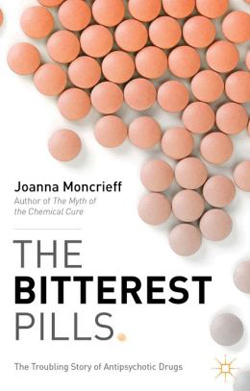More and more celebrities say they have it, but here a top psychiatrist warns the disorder is far too readily diagnosed, leaving many trapped on ‘zombie’ pills
The Daily Mail – September 23, 2013
By Dr. Joanna Moncrief
Bipolar disorder has become the ‘fashionable’ mental health diagnosis – helped, no doubt, by the fact that many celebrities, including Catherine Zeta-Jones and Stephen Fry, have said they, too, are sufferers.
But as a new book reveals, the readiness with which so many people are being diagnosed as bipolar means they’re needlessly prescribed heavy-duty drugs – with serious consequences for their health…
Psychiatrists are interested in drugs because we use a lot of them. Most people who visit a doctor for a mental health problem will come away with a prescription for at least one.
The most powerful and controversial are the antipsychotics. Heavyweight tranquillisers, they transformed the treatment of schizophrenia 60 years ago.
But remarkably for drugs designed for a relatively small number of very disturbed patients, antipsychotics are now among the most profitable drugs in the world, just behind statins and on a par with diabetes medications.

The Bitterest Pills: the Troubling Story of Antipsychotic Drugs, by Dr. Joanna Moncrieff, Senior Lecturer in Psychiatry at University College London
Indeed, newer versions of the drugs, such as Zyprexa and Seroquel, have become some of the most profitable drugs in history.
In the last ten years prescriptions for antipsychotics for adults in the UK have increased by 67 per cent – last year nearly 8 million prescriptions were written in England alone.
But only a minority of these prescriptions will have been for schizophrenia, suggests the evidence – antipsychotics are no longer used only to treat severe mental disturbance, but have broken into the mainstream.
This rapid expansion of their use may be good news for the pharmaceutical companies, but often it’s far from being in the best interests of patients and we should be worried about their increasing use.
For while antipsychotics can be useful for those who are severely psychotic, these are dangerous drugs.
The growing popularity of antipsychotics has occurred partly because of the newly fashionable diagnosis of bipolar disorder.
Once considered rare and seriously disabling, bipolar disorder has been transformed – under pharmaceutical industry influence – into a vaguer notion of ‘mood swings’ that can apply to almost anyone.
As a result, if you now visit your GP with depression or anxiety or if you have symptoms such as irritability, and moodiness, there is a significant possibility you will be given a diagnosis of bipolar disorder and prescription for an antipsychotic.
Worryingly, the drugs have also been suggested as a preventative measure in young people who are not psychotic, but might be ‘at risk’, and have been widely prescribed to elderly patients with dementia.
And these drugs are harmful. I first became aware of how harmful they can be when as a junior doctor 20 years ago I worked in one of those vast asylums that was in the process of being closed down.
Some of the old inmates were still shuffling stiffly and aimlessly along the endless corridors. They looked heavily doped up and it struck me that the drugs hadn’t returned patients to normality, as we were told they did.
I got a strong feeling that as a doctor I was not being told the whole story about antipsychotics.
The text books had almost nothing about the experiences of the people who took them. I was determined to find out more about their effect.
THE MYTH OF A ‘CHEMICAL IMBALANCE’
When these drugs were discovered – more than 60 years ago – they were embraced by psychiatrists.
Unlike the straitjacket or electric shock therapy, they were said to treat not just the symptoms of schizophrenia – dulling the voices and the visions – but also to correct the underlying disease.
They did it, said leading researchers, by reversing a ‘chemical imbalance’ in the brain (although the evidence never really stacked up – a rival, and I believe far more plausible, theory said the drugs worked by damping down brain activity, but this was rapidly forgotten.)
As a result, the drugs came to be seen as a cleverly targeted and sophisticated, and essentially benign, treatment. It was a seductive claim, but it was a myth; one swallowed hook, line and sinker by the medical profession at the time.
The claim is still being propagated today, but it has been extended – now it’s said that large numbers of people may need antipsychotics to rebalance the malfunctioning chemicals that cause bipolar disorder.
 The notion that they can restore some form of biochemical harmony has allowed these unpleasant and risky substances to be misleadingly portrayed as essentially harmless.
The notion that they can restore some form of biochemical harmony has allowed these unpleasant and risky substances to be misleadingly portrayed as essentially harmless.
These are some of the things that patient information leaflets should tell you, but don’t.
Antipsychotics are likely to make you feel slow and groggy and they will sap your initiative, reduce your sex drive and dampen your emotions.
When I looked at how patients described the drugs’ effect, typically they used terms such as ‘sluggish’, ‘inhibited’, ‘feeling nothing’, ‘feeling weird’, ‘spacey’, ’empty’.
(Not for nothing are antipsychotics also used as animal tranquillisers in veterinary medicine.)
For people who are acutely psychotic, the damping down of feelings may be welcomed, but for many they are intolerable. This is one patient’s memorable description: ‘Beware. This medication is Satan in a flipping pill.’

Brain damage: Long-term treatments can cause tardive dyskinesia, which results in embarrassing involuntary movements and may be associated with mental decline
FEARS ABOUT BRAIN SHRINKING
Then you need to know about the variety of metabolic changes they can induce in your body; major weight gain, high cholesterol and other harmful fats, along with raised glucose that can lead to diabetes and heart disease (the drugs have been linked with 1,800 deaths from stroke and heart disease a year in people with dementia).
Despite these now well-recognised effects, two years ago the British Medical Journal reported that out of 300,000 psychiatric patients on antipsychotics, fewer than half were getting a metabolic check.
Antipsychotics can also shrink the brain. This had long been suspected but it was difficult to prove because schizophrenia is believed to have the same effect.
However, earlier this month a long-running brain scanning study, reported in the American Journal of Psychiatry, concluded that ‘the higher the antipsychotic medication, the greater the loss of both grey and white brain tissue’.
Long-term treatment can also cause an irreversible form of brain damage called tardive dyskinesia which results in embarrassing involuntary movements and may be associated with some mental decline.
This was clearly recognised in the early days of the drug, but as the idea that antipsychotics could treat disease became more widely accepted, psychiatrists increasingly dismissed or downplayed these involuntary movements, saying they were an effect of the disease and that anyway they were infrequent and unimportant.
But these disturbing side-effects – jerky uncontrolled movements, particularly around the face, mouth and tongue – do occur, and I regularly see patients who suffer from them. Read the rest of the article here: http://www.dailymail.co.uk/health/article-2430129/Bipolar-Why-ARE-people-More-celebrities-say-theyve-got-.html



